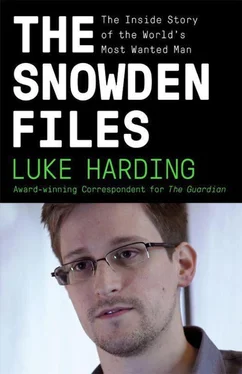The NSA’s second era from 1978 to 2001 was one of restriction, with the agency operating within Church committee parameters. What followed after 9/11 was a second unleashing: a decade in which the intelligence agencies enjoyed popular support and a boom in White House funding. This came crashing to a stop with Snowden, and the beginning of a new, uncertain fourth era. The NSA was now under the heaviest and most uncomfortable scrutiny since the 1970s.
It was also the target of some rather amusing jokes.
LOVEINT was a pun on SIGINT. This was when NSA employees used the agency’s powerful snooping tools to spy on a partner or girlfriend. NSA officials insisted the number of LOVEINT cases was small, that all the individuals involved had been fired or punished, and that most violations were self-reported. Senator Dianne Feinstein, chair of the Senate intelligence committee and the NSA’s loyal friend, said LOVEINT only happened once a year.
Still, the story was a gift to Twitter. Within hours, the hashtag ‘#NSApickuplines’ trended. The New York University media pundit Jay Rosen opened with: ‘You’re free Friday. Would you like to have dinner?’
@sickjew essayed: ‘You come here often.’
@Adonish_P continued in the same vein with: ‘I know exactly where you have been all my life.’
Perhaps the most imaginative joke came from @benwizner, who riffed off the NSA’s bulk-collection habits. He tweeted: ‘NSA walks into a bar and says, “Give me all your drinks. I need to figure out which one to order.”’
For General Alexander this was humiliating stuff. In his eight years in charge of the world’s biggest intelligence agency, Alexander had amassed more power than any previous spy chief. His imperium included three mighty domains: the NSA, the Central Security Service and US Cyber Command – set up by the Department of Defense in 2009 to spearhead the nation’s cyber-war efforts. Officially, Alexander was known by the acronym DirNSA. His subordinates came up with other names: Emperor Alexander, or Alexander the Geek.
On first impression Alexander seems nerdy. He is diminutive, has a slight lisp, and appears preoccupied with hyper-technical detail. But he is a polished political operator, his success underpinned by targeted schmoozing. Before anyone had ever heard the name Snowden, Alexander took influential congressmen on recreational tours of the NSA. He would show them his command centre at Fort Meade, a replica of the bridge of the Starship Enterprise . Those who know him say he has a strong sense of history and his own role in it. It is a place where Great Men Do Great Deeds Against Evil.
But if Alexander and his senior leadership team had hoped for White House support in their hour of need, they were to be badly disappointed. In his August speech Obama did pay tribute to the ‘men and women of our intelligence community’. He described them as ‘patriots’ who love their country and its values. But there was no presidential visit to Fort Meade, no noisy show of solidarity before the cameras.
It was left to the NSA to defend its own surveillance activities, and to make the case that that the agency’s controversial dragnet programs were actually legal. It did so against a backdrop of rising public antagonism. (One YouTube video in which Alexander features has more than 16,000 ‘dislikes’.) In the wake of Snowden, attitudes towards the intelligence community were changing for the first time since 9/11. In July a Washington Post/ ABC poll showed that 39 per cent believed it was more important to preserve privacy than to investigate terrorism; in 2002 the figure was just 18 per cent.
With the surveillance issue now so obviously toxic the Obama administration did something it was good at: it sat on the fence. Inside a defensive Puzzle Palace there was incredulity at this, mixed with peevishness. The agency, an inward-looking institution, was used to getting its own way. Serving officials were unable to speak out. But former NSA staff made no secret of the fact they felt the White House had chucked them under the bus.
‘There has been no support for the agency from the president or his staff or senior administration officials, and this has not gone unnoticed by both senior officials and the rank and file at the Fort,’ Joel Brenner, the NSA’s former inspector general, moaned in the pages of Foreign Policy , referring to the view from Fort Meade. The magazine quoted former intelligence officials who said morale inside the NSA was low. The scrutiny following Snowden’s leaks, coupled with budget cutbacks, meant that the spies were ‘hurting’, one said.
An official White House photo captures this administration–agency estrangement. In November Obama and Vice President Biden met with senior military leaders. The venue was the White House cabinet room. Obama sits in the middle, facing towards the camera, his right hand raised to make a point. At the far end of the oval table is a lonely General Alexander, framed by two oil paintings, in the seating equivalent of Siberia. The president and NSA chief may have chatted later over dinner. But if they did, no photo was ever released.
In large part, the NSA had itself to blame for this lack of a political embrace. Alexander’s early response to the Snowden leaks was bungled. He initially claimed that the NSA’s controversial domestic bulk-collection programs had stopped an impressive 54 terrorist plots, implying that these took place in the US.
Alexander’s deputy Chris Inglis subsequently conceded that only about a dozen of these plots had any connection to the US homeland. Then he said that just one of them might have been disrupted as a result of mass surveillance of Americans. (He was also ambiguous as to whether the plots were real ‘plots’; some of the citations he gave had more to do with financial transactions.)
But the biggest damage to the NSA’s case on Capitol Hill came not from Alexander but from Clapper, the overall head of the spy agencies. Clapper had given a false answer to Ron Wyden back at the Senate hearing in March. Asked if the NSA collected ‘any type of data at all on millions or hundreds of millions of Americans’, he gave an unqualified and emphatic reply: ‘No, sir. Not wittingly.’
This answer came back and bit him. Lying to Congress would be serious. After the Snowden revelations Clapper sought to finesse his reply, describing it as ‘the least untruthful answer’ possible in a public hearing. But this didn’t work: Wyden’s office had given him 24 hours’ notice of the question and an opportunity to correct the record shortly afterwards. Clapper changed his account to say he had simply forgotten about collection of domestic phone records. This erroneous testimony sparked calls for his dismissal or resignation. Clapper publicly apologised to the Senate panel – notably not to Wyden specifically – after the outcry over his prevarication spread.
Still, there were loyal supporters who defended the NSA with gusto. One was Feinstein, in charge of the agency’s oversight. On the day after Snowden revealed himself as the leaker her response was uncompromising. ‘I don’t look at this being a whistleblower. I think it’s an act of treason,’ she said. ‘He violated the oath. He violated the law.’ Feinstein denied that collecting phone records and internet communications amounted to any kind of surveillance, saying the NSA merely scooped up the kind of information found on a telephone bill.
After news that the agency had hacked Merkel’s personal mobile, however, Feinstein did a volte-face. She called for a ‘total review’ of all intelligence programs, and grumbled that her Senate intelligence committee had not been ‘satisfactorily informed’. Spying on friendly nations and prime ministers wasn’t on, she said: ‘With respect to NSA collection of intelligence on leaders of US allies – including France, Spain, Mexico and Germany – let me state unequivocally: I am totally opposed.’
Читать дальше












